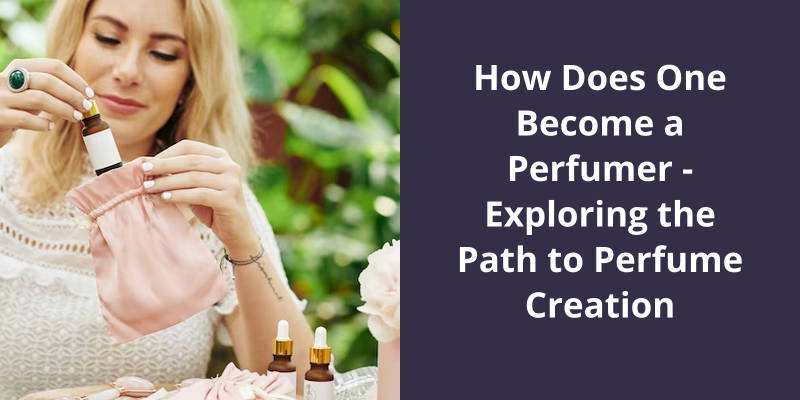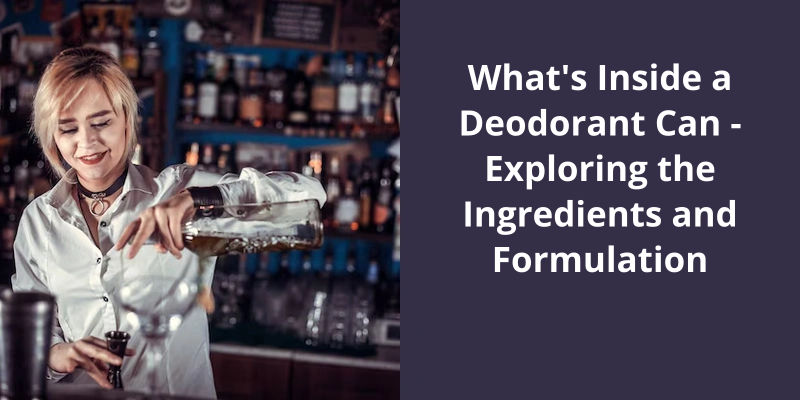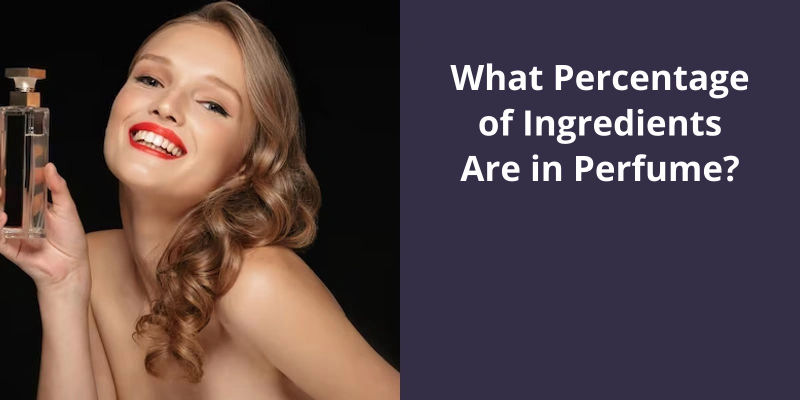How does one become a perfumer? This question may seem elusive, yet it holds the key to unlocking the world of perfume creation. Perfumers undergo a rigorous journey of education and training to develop their olfactory skills and artistic sensibilities. Many aspiring perfumers choose to pursue a Master's degree in either Cosmetics, Flavors, and Perfume Engineering or Flavors, Perfumes, and Cosmetics, offered by prestigious institutions like ISIPCA and the Ecole Supérieure du Parfum. These programs provide a comprehensive understanding of the science and art behind perfumery, equipping students with the knowledge and skills to blend aromatic materials and create captivating fragrances. Becoming a perfumer is no easy feat, but with dedication, passion, and the right education, one can embark on a fascinating journey into the world of scent.

Is It Hard to Become a Perfumer?
Is it hard to become a perfumer? The answer is a resounding yes.
First and foremost, one must possess certain natural talents to even have a chance of entering the perfume world. A keen sense of smell is crucial, as perfumers need to be able to distinguish between thousands of different scents and ingredients. They must also have a refined sense of taste and an innate ability to detect subtle nuances in fragrances. These natural abilities can’t be taught or acquired through training; they’re inherent traits that only a select few possess.
To further enhance their skills, aspiring perfumers must complete specialized studies in perfumery. These programs delve into the history, techniques, and artistry of perfume creation. They also have the opportunity to practice their skills through hands-on workshops and internships, gaining valuable experience in the field.
It isn’t a path for the faint-hearted or those seeking quick success. Perfumers must constantly stay up-to-date with new ingredients, trends, and techniques in the industry, always pushing the boundaries of their creativity.
It’s a path that demands unwavering passion, dedication, and a lifelong commitment to the art of fragrance creation.
The Process of Creating a Perfume
Creating a perfume involves a meticulous process that requires a deep understanding of fragrance composition and chemistry. Perfumers, also known as fragrance creators, typically begin their journey by studying the science of perfumery and gaining knowledge of various raw materials used in scent creation. This includes familiarizing themselves with essential oils, aroma chemicals, and other fragrance compounds.
To develop their olfactory skills and train their senses, aspiring perfumers often undertake rigorous sensory exercises such as identifying and describing different scents. They learn how different notes interact and blend together to form harmonious fragrance combinations.
Once they’ve acquired a solid foundation, perfumers start experimenting with blending various aromas. They carefully mix different fragrance ingredients, considering their olfactory characteristics, volatility, and the desired intensity. This process is often carried out through trial and error, as perfumers fine-tune their creations until they achieve the desired scent profile.
In addition to technical skills, creativity and artistic flair play a crucial role in perfumery. Perfumers draw inspiration from a range of sources, including nature, art, emotions, and memories. They learn to translate abstract concepts into olfactory compositions, harnessing their imagination to create unique and captivating fragrances.
Becoming a perfumer is a journey that requires years of dedication, practice, and perseverance. It’s a delicate craft that combines science, artistry, and an intimate knowledge of the human sense of smell.
To pursue a career as a perfumer, it’s essential to acquire a professional degree in chemistry with a specialization in perfume, aroma, and cosmetic formulation. Through this comprehensive program, individuals gain extensive knowledge about the natural ingredients commonly used in perfumes, along with in-depth modules covering the safety and toxicology aspects associated with these elements. This educational background equips aspirants with the necessary qualifications to embark on a successful journey as a perfumer.
What Qualifications Do I Need to Be a Perfumer?
To become a perfumer and explore the path to perfume creation, you’ll need certain qualifications and knowledge in the field. One of the most essential qualifications is a professional degree in chemistry, with a specialization in perfume, aroma, and cosmetic formulation. This degree program offers in-depth knowledge about the natural ingredients that are used in perfumes. From understanding the chemistry of these ingredients to their extraction methods, this program covers it all.
Perfumers need to have a thorough understanding of the potential risks and hazards associated with certain ingredients. This knowledge allows them to create fragrances that aren’t only appealing but also safe for use.
Understanding the chemical properties and reactions of different ingredients helps in creating a harmonious blend of scents. It allows perfumers to analyze and predict the interactions between various fragrance notes.
Networking is also essential in the perfume industry. Attending industry events, conferences, and workshops enables aspiring perfumers to connect with established professionals and learn from their experiences. These interactions can open doors to job opportunities or mentorship programs that can further enhance their skills and knowledge.
A deep appreciation for scents and the ability to recognize different fragrance notes are essential skills that can be developed through practice and exposure to a wide variety of perfumes.
With the right qualifications and dedication, one can embark on an exciting journey towards creating unique and captivating perfumes.
In addition to the wide range of salaries for perfumers in the US, there are various factors that can influence their earning potential.
Can Perfumers Make a Lot of Money?
One of the questions that often comes to mind when considering a career as a perfumer is whether or not it can be a lucrative profession. While the idea of creating luxurious and expensive fragrances may seem glamorous, the reality is that the financial aspects of being a perfumer can vary widely. The average perfumer salary in the United States typically ranges between $38,000 and $130,000 per year, depending on various factors such as experience, expertise, and location.
Of course, these rates can fluctuate depending on the specific project and client.
In terms of location, perfumers tend to earn the highest salaries in states such as West Virginia, Massachusetts, and New Hampshire.
It’s important to keep in mind that becoming a successful perfumer takes time, dedication, and passion for the craft. The path to perfume creation isn’t easy, and it requires a deep understanding of fragrance ingredients, artistry, and market trends. It’s also important to keep up with the latest industry developments and constantly refine ones skills in order to stay competitive in the field.
How Do Perfumers Establish Themselves in the Industry and Build a Client Base?
- Specialize in a specific area of perfumery, such as creating niche fragrances or designing scents for certain industries.
- Attend perfumery schools or workshops to gain formal training and knowledge in fragrance creation.
- Network with industry professionals, such as established perfumers, fragrance brands, and suppliers.
- Offer your services to local boutique fragrance stores or beauty retailers to showcase your talent and gain exposure.
- Create an online portfolio or fragrance blog to showcase your work and attract potential clients.
- Utilize social media platforms to engage with fragrance enthusiasts and showcase your expertise.
- Collaborate with other industry professionals, such as fashion designers or artists, to create unique fragrance experiences.
- Participate in fragrance competitions or exhibitions to gain recognition and build credibility within the industry.
- Attend industry trade shows or conferences to stay updated on the latest trends and network with potential clients.
- Build a reputation for exceptional customer service and attention to detail to establish long-term relationships with clients.
The rising popularity of personal grooming and the desire for luxurious and unique scents have fueled the demand for perfumers worldwide. The global perfume market has seen significant growth, with a projected compound annual growth rate of 5.9% from 2023 to 2030. As consumers continue to seek out new and enticing fragrances, the need for skilled perfumers to create these in-demand scents remains high.
Are Perfumers in Demand?
Perfumers are indeed in high demand in todays market, as the global perfume industry continues to experience significant growth. The market size for perfumes reached a staggering USD 50.85 billion in 2022, and experts predict a compound annual growth rate (CAGR) of 5.9% from 2023 to 2030. This continuous rise in demand can be attributed to several factors.
One of the key drivers behind the increasing demand for perfumers is the growing trend of personal grooming. Consumers worldwide are increasingly conscious of their appearance and seek to enhance their personal style through the use of fragrances.
Moreover, the demand for luxury and exotic fragrances has also contributed to the need for skilled perfumers. In recent years, there’s been a surge in the popularity of niche and artisanal perfumes, which offer unique and exclusive scents. These fragrances appeal to individuals who desire a more personalized and distinctive olfactory experience.
In addition to the demand generated by consumers, businesses in various sectors also require the expertise of perfumers. This creates additional employment opportunities for perfumers, as they play a vital role in creating signature scents that distinguish brands in these competitive markets.
Emerging Trends in the Perfume Industry: This Topic Could Explore the Latest Trends in the Perfume Industry, Such as Clean or Sustainable Fragrances, Gender-Neutral Scents, or the Use of Synthetic Ingredients.
- Clean or sustainable fragrances
- Gender-neutral scents
- Use of synthetic ingredients
- Personalization in perfumes
- Online fragrance shopping
- Niche perfumes
- Artistic collaborations
- Customizable fragrance experiences
- Focus on natural and organic ingredients
- New fragrance technologies
Conclusion
Renowned institutions such as ISIPCA and the Ecole Supérieure du Parfum have gained recognition for their exceptional perfume creation programs.





